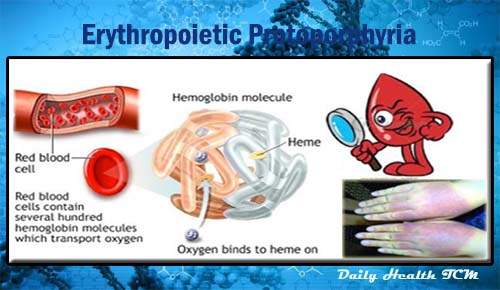What is Erythropoietic Protoporphyria?
Erythropoietic Protoporphyria (EPP) is a collection of genetic disease called porphyrias. EPP is a hereditary disease caused by an enzyme deficiency ferrochelatase. Protoporphyrin accumulates in the body especially in the red blood cells, in the liver and in the skin which becomes sensitive to light.
There is usually a shortage of an enzyme (a protein which helps convert one chemical substance into another), called ferrochelatase (FECH), that adds iron to protoporphyrin to make haem. As a result of the enzyme shortage, protoporphyrin levels build up in the blood. As blood passes through the skin, the protoporphyrin can absorb the energy from sunlight. This sets off a chemical reaction that can slightly damage surrounding tissues. The nerve endings in the skin interpret this as itching or burning pain, and if the blood vessels are affected, they can leak slightly, causing swelling. The light that the protoporphyrin absorb is different from that which causes normal sunburn. Sunburn is caused by the shorter wavelengths of ultraviolet light (UVB), but in EPP the skin is more sensitive to longer wavelengths (UVA) and visible light. Light of the wavelengths that cause the skin reaction in EPP, umlike reaction in EPP, unlike those that cause sunburn, can pass through window glass.
Symptom:
- The first symptom that usually arises is in childhood. At this stage the child will feel pain in the skin when it is exposed to sunlight. It often occurs in the hands, feet, face and ears.
- Usually people with this disease have a soft skin and when it is infected it will cause the skin to become red, swollen and blistered.
- There is a blend scars on the skin that can sometimes be seen on the nose, cheek, hand and thumb.
How is EPP diagnosed?
The diagnosis is usually suspected from the story that is story that is told to the doctor, and can be confirmed by a blood test. The blood test measures the amount of protoporphyrin in the blood. Some doctors will also ask for a stool sample to measure the level of protoporphyrin. No urine tests are relevant to this condition except to exclude other types of porphyria.

